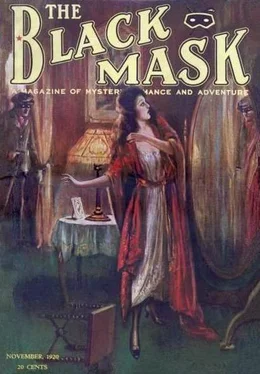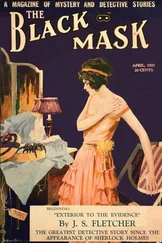Hamilton Craigie - The Black Mask Magazine (Vol. 2, No. 2 — November 1920)
Здесь есть возможность читать онлайн «Hamilton Craigie - The Black Mask Magazine (Vol. 2, No. 2 — November 1920)» весь текст электронной книги совершенно бесплатно (целиком полную версию без сокращений). В некоторых случаях можно слушать аудио, скачать через торрент в формате fb2 и присутствует краткое содержание. Город: New York, Год выпуска: 1920, Издательство: Pro-distributors Publishing Company, Жанр: Классический детектив, на английском языке. Описание произведения, (предисловие) а так же отзывы посетителей доступны на портале библиотеки ЛибКат.
- Название:The Black Mask Magazine (Vol. 2, No. 2 — November 1920)
- Автор:
- Издательство:Pro-distributors Publishing Company
- Жанр:
- Год:1920
- Город:New York
- ISBN:нет данных
- Рейтинг книги:5 / 5. Голосов: 1
-
Избранное:Добавить в избранное
- Отзывы:
-
Ваша оценка:
- 100
- 1
- 2
- 3
- 4
- 5
The Black Mask Magazine (Vol. 2, No. 2 — November 1920): краткое содержание, описание и аннотация
Предлагаем к чтению аннотацию, описание, краткое содержание или предисловие (зависит от того, что написал сам автор книги «The Black Mask Magazine (Vol. 2, No. 2 — November 1920)»). Если вы не нашли необходимую информацию о книге — напишите в комментариях, мы постараемся отыскать её.
The Black Mask Magazine (Vol. 2, No. 2 — November 1920) — читать онлайн бесплатно полную книгу (весь текст) целиком
Ниже представлен текст книги, разбитый по страницам. Система сохранения места последней прочитанной страницы, позволяет с удобством читать онлайн бесплатно книгу «The Black Mask Magazine (Vol. 2, No. 2 — November 1920)», без необходимости каждый раз заново искать на чём Вы остановились. Поставьте закладку, и сможете в любой момент перейти на страницу, на которой закончили чтение.
Интервал:
Закладка:
“A little after two bells, sir—”
“Why? Because he had mistreated you?... How did you do it?”
“I...” And there followed a stumbling, detached account of his movements from the time he left the deck until he surrendered to sleep in his bunk in the fo’castle.
“It’s fortunate for you that I found the knife,” remarked Cardigan when he had finished, “for it has your initials upon the hilt. I saw you come on deck twice while I was at the wheel; one time you went near the bowsprit but not until after I found the knife did I attach any importance to it.” He paused, resuming after a moment. “It’s quite evident that two people stabbed the captain—you and an unknown person. But who stabbed him first? Who is the real murderer? These are skeins that must be untangled. All I require of you is a close mouth and an open eye—”
“Then—then you’re not going to lock me in the brig?”
“You are free; only remember my instructions—and regard them.”
The Boy stared at him. He was dazed, stunned. Instead of a blow he had received kindness. Kindness. New and loftier emotions stirred within him; he tried to speak, to utter words that; would convey his gratitude to the mate; he could only stand and stare mutely. Nor was that dumb look, mirroring his deepest and most profound emotions, unobserved by Cardigan; it came to him as an illuminating signal-flash from The Boy’s soul.
“Now run along,” he said, not unkindly, opening the door.
In silence The Boy passed out.
As he moved through the cabin, which was faintly lit by a hanging lamp, his brain groped in a labyrinth. Some one else had sought to end Black Michael. Who was the owner of this other hand that had driven a blade into the skipper’s breast? And which of the two had accomplished his purpose, he or the unknown person?
In his agony he prayed that it was the other, for though a short while ago The White Lotus had seemed a lamp that lighted the way to this ghastly action, he now saw, with the cold clearness of returned sanity, that with blood upon his soul he was severed from even spiritual companionship with this pallid leper-child who had impressed herself so deeply upon his memory.
But how could he ever find out? It all seemed very hopeless...
As he neared the fo’castle he saw a vertical strip of yellow light cleaving the dark passage from the bulkhead door. Voices within were murmuring in hushed conversation.
He was almost in the opening when a sentence, flung against his ears with the sting of a whip, cemented him to the spot: “I only struck once, I tell you, once — yet there are two wounds...”
Those words, spoken in a voice that was lowered to a tone just above a whisper, yet strangely familiar, brought forth his breath in a gasp.
He crept nearer the source of light; peered within.
The slush-lamp was turned low, casting flickering shadows as it swung with the motion of the brig. Five of the bunks were vacant; the sixth, near another bulkhead-door, opposite The Boy, was occoupied.
Moncrief, the Creole, sat on the edge of the bunk, a cigarette between his thin, moist lips, and at his side, face arid shoulders hidden by the boatswain’s slender body, was another man. That bunk was used by the Chinese cook, The Boy knew, yet the one who lay there was not the Oriental.
They were talking again.
“By gar, eet ees ghastly, m’sieur,” commented Moncrief.
“Yes—a ghastly failure,” spat out the other. “ ’Poleon” — a note of intensity came into the voice — “I see but one thing to do now. By four in the morning we should be near the coral reefs—they’re just a mile off course. Wajo, the Polynesian, will be at the wheel; we can overpower him—”
“ Sacre dam, m’sieur!” broke in the boatswain. “Do zat — zat? ”
“Why not? To reach Tahiti means investigation by the authorities. If the brig goes down she carries all evidence with her. We can escape in the longboat; islands are numerous along here—”
“But, m’sieur, ze knife of ze firs’ mate zat you lef’ in ze—”
“God knows what became of it! When he found the body he must have hidden the damned thing — and if I knew where... But no; I’m afraid to try it now. The Second wound is what has scared me off; it’s a sign to warn us.” Then he swore a volley of oaths so vile that they burned The Boy’s ears.
“With the captain killed,” went on the voice, after a moment, “and the first mate disposed of by the incriminating evidence, we could have easily bought the crew over to us. With me in command we could have gone straight to Melbourne for the cargo of rum. McAllister would have paid well when we delivered it to him at Hiva-oa, for when his cursed natives have plenty of rum they do more work—and since the French government has restricted the— Oh, well, what’s the use to talk of it? You got the best of the deal; I had the dirty work of killing the swine. It was too big an undertaking for two men to try—”
“But, m’sieur—”
“No, ’Poleon; the only thing to do now is save ourselves...”
A pregnant dread was spreading through The Boy’s body, a sensation of abysmal emptiness. The coral reefs; the Polynesian. Then they intended to—
Now he could learn who stabbed Black Michael first! But did he want to know? Yes, the truth was far better than horrible uncertainty. Yet he dared not enter the fo’castle alone; he must go and bring Cardigan.
As he turned to creep away a sudden plunge of the vessel sent him flat upon the deck of the passage with a sound that seemed loud enough to be heard from stem to stern.
He was almost on his feet when a lean figure appeared in the bulkhead door. Instantly he recognized Moncrief. He made a dive toward the lazarette, but the boatswain was too quick for him; he flung his lithe body upon him and bore him to the floor.
The Boy opened his lips to cry out and the Creole’s fist descended upon his mouth. The pain stung him to action. With a desperate wrench he freed himself and fell against the bulkhead, but before he could move a second figure was momentarily silhouetted upon the light in the oblong aperture—a figure that hurled itself upon him, pinning him to the wall.
Again he tried to scream—again a fist bruised his lips horribly. He felt blood dripping from his chin.
“No, don’t—” he cried, his mouth throbbing with pain. Something crashed down upon his skull and as he fell, plunging into what seemed a depthless abyss, a picture was photographed upon his brain—that of a dark, sinister figure silhouetted upon the glow in the bulkhead door.
Then the world reeled, a drunken universe—
IV.
A knock on the door of his quarters brought Cardigan out of a light sleep. Sitting up on the edge of his bunk he called, “Come in!”
The opening of the door admitted a wavering blade of light and in the frame, outlined upon the pale illumination from the main cabin, was a form.
“It’s Stearns, sir,” announced the man. “I’m sorry to wake you up, but I have something queer to report.”
Cardigan rose. “Wait a second till I make a light.” Then a moment later when the slush-lamp cast its ill light upon his nearly-clad form he added, “All right, Stearns, what is it?”
The midshipman’s sallow face seemed paler than ever; he shifted uneasily from one foot to the other.
“I’ve seen something that I don’t quite understand, sir,” he began. “I had just been relieved by Wajo and was going toward the fo’castle when I happened to glance athwart the brig. I saw what looked like two shadows; then I realized they weren’t shadows but men—two of them, moving along the port deck. They disappeared behind the after-cabin as soon as I saw them, but I got the impression that they were carrying something—or—or someone. A minute later I could have sworn I heard a cry. It scared me a little, sir, after all that’s happened on this brig, so I hurried down in the fo’c’s’le. I didn’t know what to do — and after about an hour I decided to tell you.”
Читать дальшеИнтервал:
Закладка:
Похожие книги на «The Black Mask Magazine (Vol. 2, No. 2 — November 1920)»
Представляем Вашему вниманию похожие книги на «The Black Mask Magazine (Vol. 2, No. 2 — November 1920)» списком для выбора. Мы отобрали схожую по названию и смыслу литературу в надежде предоставить читателям больше вариантов отыскать новые, интересные, ещё непрочитанные произведения.
Обсуждение, отзывы о книге «The Black Mask Magazine (Vol. 2, No. 2 — November 1920)» и просто собственные мнения читателей. Оставьте ваши комментарии, напишите, что Вы думаете о произведении, его смысле или главных героях. Укажите что конкретно понравилось, а что нет, и почему Вы так считаете.












